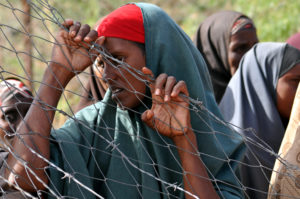In the past two weeks the recurrent of violence against women in Somalia has brought to the fore the need for lasting solutions to end Gender-based Violence. On March 2, 2019, a court in Garowe, Puntland, north-eastern Somalia sentenced five men to death for the gang rape of a 16-year-old. A week earlier al-Shabaab had killed 9 civilians; 6 of them women and in Gaalkacyo, Puntland, Aisha Ilyas Adan, a 12-year-old girl was raped and her body dismembered by seven boys known to her family.
The horrific details of Aisha’s rape and killing has angered many, demonstrators took to the streets in Galkacyo calling for accountability by way of criminal justice system instead of often used lenient customary Somali law. Unfortunately, these cases are just the tip of a deeply structural problem with countless women, men, girls and boys in Somalia being subjected to sexual violence and the ongoing conflict has made it worse.
The protracted conflict has eroded the strength of all key institutions, especially the criminal justice system, thus eroding human rights protections for survivors to seek justice in a dignified manner. Besides formal institutions, the conflict in Somalia has seen a breakdown in social norms including family and community mechanisms that prevent sexual violence. This is particularly acute because the inherent gender dynamics within the Somali community reinforce patriarchal beliefs that a man’s role is to control and protect women thus creating an enabling condition for sexual violence to thrive.
Trauma
Even though extreme trauma by survivors of sexual violence is predictable, it is particularly aggravated by feelings of shame, stigma and rejection by spouses and family members. In certain cases, the victim is more stigmatised than the perpetrators. Survivors and families weigh seeking medical and psychological support against social cost of disclosure and in the end often opt for the former. The stigma also deters survivors from reporting crimes and seeking redress. The culture of silence often exacerbates both medical and emotional problems.
Shame, stigma and rejection that survivors experience are often the result of discrimination and contribute to the long-term societal oppression of survivors of sexual violence.
According to the World Health Organization’s world report on violence and health, sexual violence is “any sexual act, attempt to obtain a sexual act, unwanted sexual comments or advances, or acts to traffic, or otherwise directed against a person’s sexuality using coercion, by any person regardless of their relationship to the victim, in any setting. Sexual violence takes multiple forms and includes rape, sexual abuse, forced pregnancy, forced sterilization, forced abortion, forced prostitution, trafficking, sexual enslavement, forced circumcision, castration, and forced nudity.”
To ensure an end to sexual violence in all conflicts, international and regional bodies should enact resolutions to address sexual violence and hold powers accountable. The challenge is getting States to implement these resolutions at a national level, by creating policies and laws that seek to prevent and respond to sexual violence including in conflict settings.

Here are suggestions of what we need to do to address the rampant sexual violence in Somalia.
1. Access to comprehensive health services
Establish more accessible comprehensive health services for survivors of sexual violence, including sexual and reproductive health services, and mental health services. Many of the healthcare facilities are inaccessible to those who need them. Many survivors especially those from rural and conflict areas have nowhere to go, the facilities are far and the roads they use are insecure.
2. Right laws
Criminalize all forms of sexual violence and define them in accordance with the highest international standards. The Somali cabinet has taken positive steps by passing the Sexual Offenses Bill, it is now time for Parliament to pass and enact the bill.
3. Proper reporting and investigations
Thoroughly investigate all reports of sexual violence committed by civilians or by security personnel and bring the alleged perpetrators to justice. Ensure that security agents and military commanders, in accordance with international humanitarian law, use their authority and powers to prevent sexual violence, including by combating impunity.
4. Training for law enforcement officers
Train the police, prosecutors and the judiciary on the best practices for investigation, prosecution and adjudication of crimes under international law and in identifying and addressing gender inequality in relation to access to justice.
5. More women in security sector
Create more gender desks and recruit more women police officers to ensure sufficient points of access for women to report incidents of sexual violence.
6. Accountability
Ensure that members of the security forces immediately cease all violations of international human rights law and international humanitarian law. Issue clear orders prohibiting sexual violence, provide forces with appropriate training in the prohibition of sexual violence and in human rights and humanitarian law, and establish mechanisms to adequately monitor the conduct of forces.
7. Open civic space, Break the Stigma
Allow humanitarian organizations and civil society to create programmes to raise awareness about the prevalence of sexual violence in the context of the conflict in Somalia and its gendered impact. This will reduce stigmatization of victims of sexual violence ensuring that survivors live with dignity and respect, and that they can get justice, an assurance of non-repetition and other forms of support and compensation to make up for the past violations and abuses.
None of these solutions are impossible to achieve if the Somali government prioritised the protection of survivors of sexual violence. Women must be at the forefront of implementing these solutions already with little support. Sexual violence in Somalia will only begin reducing once survivors of sexual violence feel empowered enough to claim their rights.
Amina Hersi is a human rights analyst with a focus on gender justice.
